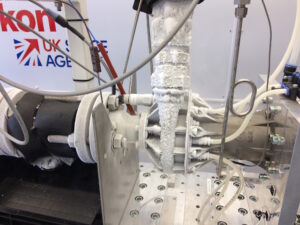Five UK organisations have been awarded a total of £300,000 from the UK Space Agency to speed up the development of innovative space technology.
Recipients include the University of Leeds, which will develop 3D printing methods and liquid-crystal technology, similar to that in our television screens at home, to develop far-infrared sensors for studying climate change and star formation. Another project, led by Rocket Engineering in London, will create a compact propulsion system the size of a house brick for use in nano and small satellites. The engines use electromagnets to enable the satellites to move for in-orbit spacecraft servicing or space debris mitigation.
LENA Space, a small company based near Salisbury, is developing a rocket engine for launch vehicles. Called the Modular Propulsion Engine (MPE), the overall development plan is for an off-the-shelf, flight qualified propulsion system to support small launch vehicle programmes. The Pathfinder project will involve detailed design work on the MPE, particularly integrating several previously developed LENA subsystems – including pintle injector, electric drive cryogenic pumps and AM manufactured nozzles – into a single engine.
The funding comes from the UK Space Agency’s National Space Technology Programme (NSTP), which supports development of space technologies, encourages collaboration between industry and academia, and encourages new entrants to the space sector.
Science Minister Amanda Solloway said: “This investment will help UK space businesses fast-track innovative technologies with real scientific and commercial potential, supporting our aim for the UK to secure 10 percent of the global space market by 2030.
“From observing climate change from space to protecting our satellites from hazardous space debris, these technologies could expand our reach in space and improve life here on Earth.”
Since launching in 2011, NSTP has supported 300 projects. Previous successful applicants include Belstead Research Ltd, who improved drag sail methods for removing space debris, and a collaboration between the University of Bristol and Rutherford Appleton Laboratory to track and analyse volcanic ash clouds, which can damage jet engines.
Charles McCausland, Head of Major Projects and Technology Development, UK Space Agency, said: “The UK Space Agency has a strong track record of backing early-stage technologies with future potential, and these five projects promise to pave the way for further space innovation.
“As the UK extends its ambitions for the space sector, early support of this kind could prove decisive in helping us get ahead in an increasingly competitive global environment.”
The UK has a thriving space industry that generates an income of £14.8 billion each year. The UK Space Agency works closely with industry and academia to fund new technologies, boost skills, promote growth and inspire careers in the space sector .
The announcement comes during British Science Week (5th – 14th March), a 10-day programme of thousands of events running throughout the whole of the UK with the aim of celebrating science, engineering, technology and maths, coordinated by the British Science Association and funded by the UK Research and Innovation (UKRI).
 Instrumentation Monthly Test | Measurement | Control
Instrumentation Monthly Test | Measurement | Control




